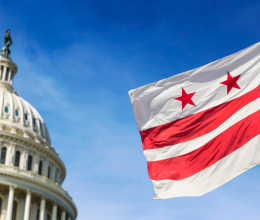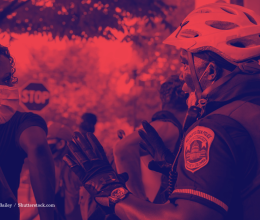WASHINGTON — Today, President Biden stated that if the Senate passes a disapproval resolution S.J. Res.12, that would overturn a local D.C. law to bring the District's outdated criminal code in line with national standards, he would sign it. The Revised Criminal Code Act (RCCA), which was overwhelmingly approved by the D.C. Council last fall and supported by 83% of District residents, would improve public safety and eliminate unclear policies in the District.
Monica Hopkins, American Civil Liberties Union of the District of Columbia, Executive Director, said:
"President Biden's support to overturn the Revised Criminal Code Act undermines D.C.'s fight for statehood and maintaining home rule. The present-day criminal code in D.C. was created in 1901, an era before women or many Black people even had the right to vote. In 2000, Brooklyn Law School professors ranked D.C.'s criminal code as one of the worst in the country based on how outdated, vague, and inconsistent it is. The RCCA was created after a decade-long process in which a nonpartisan Criminal Code Reform Commission and the D.C. Council held numerous public hearings and votes to pass the bill. This lack of clarity leads to judges, prosecutors, and defense attorneys spending countless hours repeatedly negotiating the intent of the codes, convictions getting overturned because of the lack of clarity, and costly litigation that harms both defendants and victims. With the RCCA in place, police, district attorneys, public defenders, victims, and residents would have clear criminal codes that are realistic for D.C. and create a safer community.
The disapproval of the RCCA stems from misinformation and lies that it would make the District less safe. Along with clear and consistent language, the bill would increase the penalty for attempted sexual assault from 5 years to 15 years, increase possession of firearm silencer or bump stock from 1 year to 2 years and create a now penalty for reckless endangerment with a firearm with a maximum sentence of 2 years, along with other changes. Yet, District residents' attempts to share the facts and the need for the RCCA went unheard in Congress, where D.C. residents don't have full representation.
The 700,000 people of D.C. supposedly live in a representative democracy, yet they are routinely denied their basic right to self-governance because D.C. is not considered a state. While conversations about the need for statehood for D.C. can sometimes sound vague or theoretical, this current situation, with D.C.'s Revised Criminal Code Act (RCCA) now in threat of being overturned, makes the harm of denying full citizenship to the people of D.C. loud and clear. The residents of D.C. must be allowed to update their own local laws, especially ones where there is needed clarity, consistency and uniformity to make D.C. safe.”

